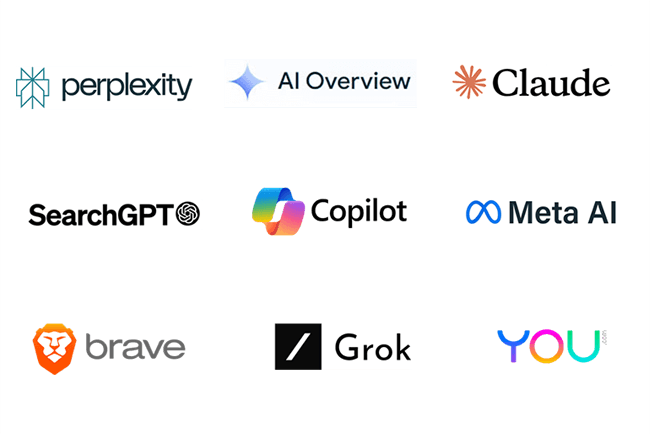Arc Intermedia was optimizing for AI-driven search before most agencies knew it mattered. Our early investment in decoding how large language models discover, interpret, and deliver information gives our clients an advantage.
Through continuous testing, advanced prompt and topic research, and deep analysis, we ensure our clients’ content is visible where audiences are asking questions and seeking answers. Arc’s pioneering expertise positions brands at the forefront of AI search, helping them capture relevance, authority, and attention in the new era of discovery.

Digital marketing is a business investment and must produce real returns. It’s what our clients expect. It’s what we deliver.
Client Revenues
Transactions & Leads
Website Visitors



Assess yours and your competitors’ brand identities across the internet
Evaluate your existing SEO and off-site tactics
Implement optimizations on and off your site
Create customized reporting for each client’s needs

Call 610.347.5661 or fill out this form to get started.
Are GEO, AEO, and SEO different? Do you need them all? Does it replace other digital marketing efforts?
Here are important answers to commonly asked questions about the current state of search:
AI search and answer engines use artificial intelligence—particularly large language models (LLMs)—to provide conversational responses to user queries. Instead of returning a list of links, these platforms synthesize answers from multiple sources and deliver them in natural language. Examples include Microsoft Copilot (formerly Bing Chat), Google Search Generative Experience (SGE), Perplexity, and platforms built on GPT-based architectures. These engines represent a fundamental shift in how information is discovered, evaluated, and acted upon.
AI search engines are reshaping the landscape of online discovery. Instead of relying solely on blue-link rankings, visibility now includes being cited or referenced within AI-generated answers. This places greater importance on authoritative content, structured data, and semantic clarity. Optimizing for search is no longer just about ranking—it's about being trusted enough to inform the AI's answer. We adapt our strategies accordingly to help your content earn visibility within both traditional and generative search experiences.
Yes. Optimizing for AI search platforms requires a deep understanding of how these models identify, interpret, and cite authoritative information. We structure your content to align with common question formats, strengthen semantic signals, incorporate schema markup, and ensure your pages are both technically sound and contextually rich. Our goal is to position your brand as a reliable source for the kinds of questions users ask AI engines.
While traditional rank tracking doesn't fully apply to AI search, we use a combination of emerging tools and methodologies. These include monitoring brand mentions in AI outputs, citation tracking within engines like Perplexity and Copilot, and traffic attribution from AI-driven sources. We also benchmark content against AI-answer inclusion criteria and use real-time testing to validate optimization efforts. As tools evolve, we continually refine our measurement models.
Absolutely. We create and optimize content specifically designed to be picked up and featured by AI-powered engines. This includes FAQ-rich formats, concise answer blocks, authoritative guides, and content that addresses user intent with clarity and precision. We also adapt existing assets to improve their performance in AI-generated contexts, ensuring your brand stays relevant in a rapidly changing search environment.
Not yet—but they are becoming a powerful complement. Google is actively incorporating generative AI into its search experience (via SGE), while other tools like Perplexity and You.com are gaining user adoption. Instead of replacing Google, AI search is expanding the ecosystem of discovery. Forward-thinking strategies must account for this shift by balancing traditional ranking tactics with AI-oriented content optimization.
We integrate AI tools at every stage of the search process—from content ideation to optimization and analysis. These tools help us understand semantic relevance, identify question-based search patterns, audit content gaps, and test how AI engines interpret and surface your pages. Importantly, we use AI to enhance—not replace—human strategy and creativity. It’s a force multiplier that enables smarter, faster decision-making aligned with search evolution.
Industries that rely heavily on expertise, education, or decision-making guidance benefit most. This includes healthcare, finance, legal services, technology, education, and B2B SaaS. Brands that publish authoritative, trustworthy content stand a better chance of being featured in AI answers. However, virtually all sectors can benefit by preparing for the growing role of AI in how users search and engage with information.
The pace of change is unprecedented. New AI search capabilities, interface changes, and platform features are rolling out monthly—if not weekly. We stay ahead through continual experimentation, real-time platform monitoring, collaboration with AI search beta programs, and deep engagement with industry thought leaders. Staying relevant in this space requires proactive adaptation, and we bring that agility to every client engagement.